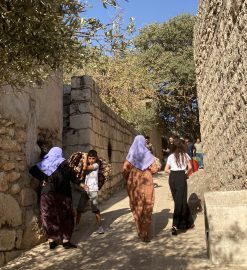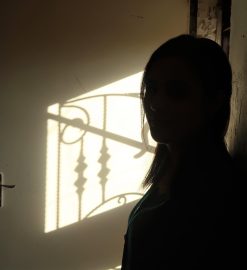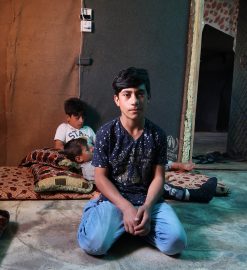Egyptian Women Brave Crowds to Protest Morsi
Written for Al-Monitor June
CAIRO- 24-year-old Salma walks down the streets of Heliopolis, a neighborhood in Cairo where protests against President Mohammed Morsi are taking place on June 30. Like a lot of other women in Cairo, she had been assaulted when she took part in previous protests. “Some guy grabbed me, but I kicked him really hard. He was in a lot of pain,” she told Al-Monitor.
On this day, however, the young revolutionary feels safe at the demonstration, which has attracted large numbers of women, young people and children. They all took to the streets with one common goal: Morsi’s resignation.
Salma always advises women to keep an eye on the male protesters around them. Getting stuck in the middle of the crowd, especially on Tahrir Square, may lead to problems. And, of course, it is better if females are accompanied by male friends.
Millions of people in Heliopolis and at Tahrir are demonstrating against Morsi and the Muslim Brotherhood. Morsi has been in power for a year, and now the people are demanding that he step down. The Tamarod (Rebel) campaign collected more than 22 million signatures, starting this second revolution and calling for a day of nationwide protests against the government.
Salma had never seen so many different people at past protests, not even the ones against Mubarak. Today it feels like Egypt had won the World Cup, with a lot of smiling faces and music. Smiling herself, Salma said to Al-Monitor, “Everybody stands up against the policy of the Muslim Brotherhood, not only young revolutionaries or men, like it sometimes used to be. Because of Morsi we have a bad economy, a lot of poverty and a high unemployment rate. This affects everybody in Egypt, as you can tell.”
Salma works for the International Federation for Human Rights (FIDH), a nongovernmental organization of human rights groups, where she focuses on women’s rights in the Middle East. After the 2011 revolution, a lot of women were being assaulted, some of them gang raped, on Tahrir Square. Salma believes that these rapes were planned by the attackers, who formed circles around their victims while committing such crimes.
She explained, “The first circle is to isolate girls from their friends and to harass and rape her. The people in the second one pretend to help her, but they don’t. And the third one makes sure that people cannot reach her. We call it the circle of hell. The attackers do this because they want to exclude women from the rallies, or because they want to humiliate Egyptian men. They often see it happen, but cannot help the girl, which hurts them too.”
In the run-up to June 30, a number of sexual harassment cases on Tahrir Square were being reported. A few girls were raped by male protesters, including a 22-year-old Dutch girl attacked by several men. Salma thinks that these attacks were possibly organized by the Muslim Brotherhood. When Mubarak was in charge, she contended, his government had sent people to do the same.
Speaking about one particular incident, Salma revealed, “They refer to it as ‘Black Wednesday,’ a day in 2005 when four women were sexually assaulted by policemen while protesting Mubarak’s constitutional amendments.” With a small camera, she takes pictures of the male protestors. One of them climbs on a truck and cheers on the protestors while holding a torch.
Aisha, 27, is also protesting against Morsi. With her female friends, some veiled, some not, she yells that the president must step down. Aisha stays close to her friends, just to make sure everybody is safe. For the time being, nothing bad has happened.
“It is a peaceful crowd, but you never know what’s going to happen after it gets dark,” she says, walking toward the presidential palace. Next to her, young Egyptian men are holding a big sign that says the Muslim Brotherhood has failed. None of them looks at her or her friends, but she admits it has been different in the past.
“We’re not going to take it anymore. Things have to change. The mentality of Egyptian men has to change. That’s also why I’m here, to make sure that the voice of young women is being heard,” Aisha told Al-Monitor.
Youth groups, like the April 6 Youth Movement, are also playing a significant role in these protests. They have been active since the beginning of the Arab Spring and came to feel betrayed after Mubarak stepped down and was replaced by a member of the Muslim Brotherhood.
Before rallies took over the streets of Egypt, Tamarod and other groups had requested that the people protest peacefully. On June 26 and 28, a few young Egyptians and one American were killed in clashes between pro- and anti-Morsi protesters. Hundreds were injured.
Ahmed regrets that so many people have lost their lives because of violence. According to him, Egyptians will not be able to have the early elections they want if things get out of hand. Ahmed has a strong opinion about the current situation, but he wants to get his basic rights back in the right way.
“Most young Egyptians don’t like the Muslim Brotherhood. Because of them, nothing improved for us. We cannot find jobs, we don’t have money, and our demands are being ignored. When you look at the Arab Spring, which young Egyptians started by the way, you begin to think that it was all for nothing,” he said angrily.
Ahmed cannot relate to the current president. According to him, Morsi is only preaching Islam and does not care about human rights. He also blames the president for a growing gap between Muslims and Christians and the violence of the recent days, arguing that it had been organized. Ahmed alleged, “Supporters of the MB wanted to scare us.”
Supporters of the Muslim Brotherhood are nowhere to be found near the presidential palace, which still looks like the site of a festival after the sun goes down. People are cheerful, peaceful and excited that they appear to have started a second revolution. Ahmed is really happy that things have gone smoothly.
His happiness also stems in part from seeing a lot of new faces of all types, women and men, Muslims and Christians. “Today I saw a glimpse of the old Egypt again, with a lot of people who are not afraid to confront a lousy president. Together we can make a change. But to do so, Morsi has to leave. He’s worse than Mubarak,” Ahmed asserted.
On Tahrir Square, 46 sexual assaults were reported on June 30, but in Heliopolis, none, according to Operation Anti-Sexual Harassment.



Leave a Reply